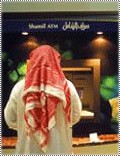Islamic Derivatives: Paradox or Panacea?
Articles on Islamic banking, March 2009
 With Islamic finance continuing to establish itself in the West - home of complex financial instruments - commentators believe that this will lead to a rise in Islamic alternatives for derivatives. With this in mind and given the recent problems caused by such instruments, we ask - what makes derivatives Islamic and are they part of the solution?
With Islamic finance continuing to establish itself in the West - home of complex financial instruments - commentators believe that this will lead to a rise in Islamic alternatives for derivatives. With this in mind and given the recent problems caused by such instruments, we ask - what makes derivatives Islamic and are they part of the solution?
Peter Lynch, one of the leading investors in the conventional space, once said before you buy or sell anything, you must be able to explain why you are buying or selling so that an 11 year old can understand - three sentences at most.
In effect, this goes to the very heart of Islamic contract law. If we take a look at Aqd' - the contract - the main scholars contend that excessive uncertainty (gharar) would invalidate the contract (for example, the subject matter needs to be specified: "I will sell you one of my cars..." would be invalid as the car has not been defined). In addition to this, excessive forms of gambling or speculation (qimar) would also invalidate the contract. Despite these concepts being well established, the use of derivatives in Islamic banking is beginning to rise.
What are derivatives?
A derivative is a contract that derives its value from the underlying asset. Lets look at an example of a farmer and a miller. Both of these parties face significant uncertainty about the future price of wheat. Therefore, to overcome this uncertainty, during the spring, the miller agrees to buy a certain amount of wheat from the farmer at price X, to be delivered to the miller in 6 months time.
As a result of this agreement (contract), both parties are now certain about the future price - the wheat farmer now knows how much money he can set aside for his family's education and the miller knows at what price he can sell the flour in 6 months time. This basic agreement is known as "hedging" - with the use of a forward contract (forward derivative)
What makes derivatives Islamic?
There are four types of economic transactions:
- Spot: commodity and money exchanged simultaneously, both on t+0
- Deferred: commodity is delivered (t+0), but money is paid on a deferred basis (t+1)
- Salam: the opposite of a deferred contract; in Salam money is paid immediately (t+0), but the commodity is delivered in the future (t+1)
- Future: both money and commodity are deferred until the future (t+1)
According to the vast majority of Sharia' scholars the first three types of transactions (spot, deferred and Salam) are valid contracts. However, in futures contracts, the delivery is generally done by cash (i.e. the monetary difference is settled) rather than physical exchange of the commodity. As a result some scholars contend that such contracts are primarily used for speculative purposes.
There are two main reasons why an investor can use a derivative: speculation and hedging. A speculator thrives on volatility, aiming to profit from a rise or a fall in the price of a security. In contrast, the purpose of hedging is to protect an investor from a volatile market by taking an offsetting position to the investor's current position. With this in mind, some Sharia scholars agree that hedging is permissible with the aim of protecting the investor against a volatile market.
Having said this, there is a problem with the above analysis for its simplicity, as pointed out by Agil Natt, chief executive of INCEIF: "Islam encourages you to manage your risk... but when does risk management end and gambling begin?" This is a question of interpretation: although there is agreement that excessive uncertainty (gharar) can invalidate a contract, there is also recognition that businesses involve some level of risk. Indeed, one can point to the Qur'an's unequivocal approval of trade (Quran, Sura 2, Verse 275) as a sign that balance needs to achieved.
However, recent events have strengthened the position of those scholars that dismiss derivatives as a form of gambling. It is contended that derivatives have a destabilising impact on the market.
One key reason for the lack of confidence in western banks is their heavy use of derivatives. This has created uncertainty over the underlying asset and its value. "In Islamic law, there must be something tangible that you are selling," according to leading Sharia scholar at HSBC Amanah, Mohammad Akram Laldin. "You cannot be selling something in which you do not know the status of the subject matter."
Two things are for certain: in the current volatile economic environment, there is a need for Sharia' compliant instruments for managing this volatility. Secondly, as shown by recent events, the complexity of derivatives can compound any problems. Some of the most popular products in the West, such as credit default swaps, have been blamed for spreading risk, rather than containing it. Therefore, it is paramount that Islamic banking practitioners develop derivatives which are benchmarked against Sharia law and not only against conventional products.

